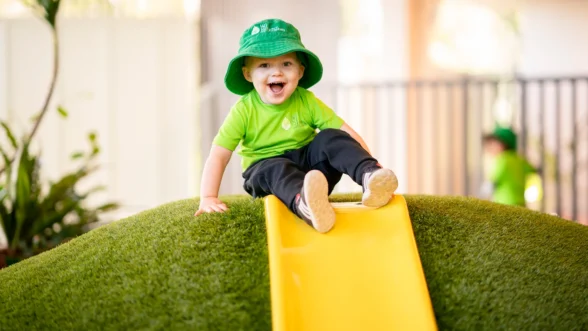
Education, Wellbeing
Wellbeing
25 March, 2026

What are toddler tantrums?
Tantrums are kind of like volcanoes. When children are overcome with difficult emotions – think anger or frustration – they explode! Obviously not literally, but tantrums can be pretty spectacular with yelling, screaming and sobbing. Some children lash out physically too, arching their backs, kicking or even running away.
When do tantrums start?
Tantrums often occur when children are aged 1-4 years old and can peak around two-years of age, which is why you may be familiar with the term “terrible twos”.
Why do toddler tantrums happen?
Temper tantrums are a normal part of childhood development. Put yourself in your toddler’s shoes: they’re starting to become their own little person with their own ideas, needs and wants, but they’re still developing their communication skills. They know what they want but they can’t articulate it. Frustration can cause little kids to boil over into a tantrum. Add in feeling tired or hungry and it’s pretty reasonable for a young child to feel out of sorts.
How to prevent toddler tantrums?
Routine, routine, routine: Following an established routine helps children know what’s coming up and what’s expected of them. It ensures they get enough sleep and can eat when they’re hungry. With a predictable routine in place, you’re more easily able to spot signs of an impending meltdown and can offer an extra snack or whisk them off for an earlier nap before their emotions spiral out of control.
Communication: Help your child to develop their communication skills. Read picture books about feelings together to help them identify and name their emotions.
Positive reinforcement: Praise and reward positive behaviours to reinforce good conduct.
Emotional regulation: Explain to children appropriate ways to behave and what’s expected of them in different circumstances. This will guide their behaviour and help them to better react to unfamiliar situations. (Obviously don’t try this while your child is in the midst of a tantrum – it won’t work then!)
Redirect attention: If you can catch escalating emotions early enough, distraction is a powerful ally in preventing tantrums! Offering a tempting toy, activity or snack may help them to refocus and remain calm.
Model healthy responses: Remember, monkey see, monkey do – and it’s the same with humans! You are your child’s greatest role model. Do your best to show them how you want them to behave and try not to lose your cool in front of them.
How to deal with toddler tantrums:
Of course, despite everyone’s best efforts, tantrums can still occur. Take a deep breath, count to ten and stay calm. Keep your child safe, show them love and support them until their emotions calm down. Here are more tips for how to deal with tantrums.
Seeking professional support:
There are some situations where you may need professional support to deal with your child’s tantrums. Speak to your GP if your child is causing harm to themselves or others during temper tantrums, or if they’re holding their breath to the point of almost fainting. Tantrums that continue to worsen after a child has turned four years old should also be mentioned to your doctor.